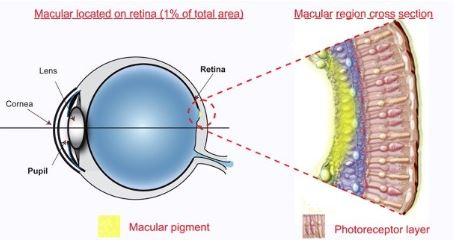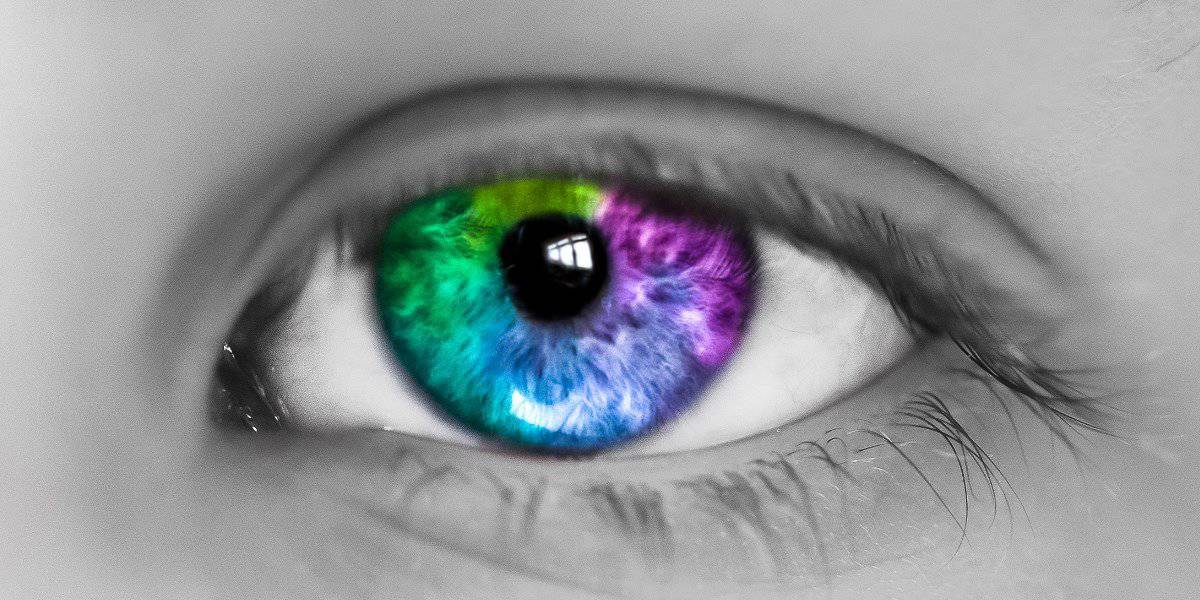Today we discuss how a flamingo’s feathers can help your vision stay sharp and manage some diseases of the eyes. People of Florida: put the birds down! I’m not telling you to EAT the feathers, but rather foods rich in the pigment that turns their light feathers pink and orange. Today we talk about a health benefit of color.
There are compounds in nature that give plants their beautiful, vibrant colors. Chlorophyll, for example, is the pigment that gives plants their traditional green color. If you’ve visited Woodstock or the North East during fall, you’ll be stuck in traffic or crowded out by often obnoxious people looking to see those traditionally green plants change to orange, red, and yellow. Those red, yellow, and orange pigments were always there, they were just drowned out by the greens. The greens are chlorophyll while the other colors are referred to as xanthophylls. Like a DJ, nature crossfades between the two as the season changes. I mention this because xanthophylls are a part of a bigger family that will influence our discussion today: carotenoids.
Carotenoids are the naturally occurring red, orange, and yellow pigments that give the color to carrots, corn, tomatoes, bananas, and more. Birds like flamingo eat so much of this food that it turns them the pink-orange colors we are so used to seeing. We’ve gone full circle yall.
A carotenoid exists in plants to help absorb light to be used in photosynthesis, but most importantly it protects the chlorophyll from light damage.
Some carotenoids, like beta-carotene, have special ring structures, giving them the ability to be converted to retinol, also known as Vitamin A. Vitamin A has crucial roles as an antioxidant in the body, but in particular, it helps the eye work better and improves vision.
All those pretty colors are so vital for our health. They’re all related to each other, have many functions in life-processes in plants and animals, and in us, they are especially crucial to eye health.
Lutein is a carotenoid that the body uses to protect the eyes and optimize our visual performance.
I Wear My Sunglasses At Night
The back surface of your eye is the retina. Think of this as the projector screen; the light bouncing off the objects in the world is projected (upside down) on that back surface, which is then translated by our brain into what we see.
Right near the middle is a small area that is responsible for the quality of that image we see – the macula. It’s exposed to more harmful types of light than ever before, and that light can do some damage. Light waves carry light and energy, and constantly bombarding a sensitive area of the body WILL result in damage over time.
So our body created a set of “shades” to apply to the macula to protect it. This is called macular pigment, a protective layer created by… wait for it… lutein. Well, lutein and its cousins zeaxanthin and meso-zeaxanthin.

When you think of lutein, think of it as your body’s natural sunglasses.

Lutein is important. Therefore, we must make sure we have enough. Unlucky for us, our body doesn’t synthesize it. Lucky for us, plants do, and plants are tasty.
Lutein Rich Foods
Lutein cannot be synthesized and therefore must come from the diet. It is found in colorful fruits and vegetables, specifically dark, leafy greens and orange-yellow produce.
Here are some lutein-rich foods (per 100g serving):
- Kale (raw) – 39.6 mg
- Kale (cooked) – 18.2 mg
- Spinach (raw or cooked) – 11-12 mg
- Peas (raw) – 2.6 mg
- Pistachios – 1.2 mg
- Broccoli – 1 mg
- Carrots (cooked) – 0.7 mg
- Eggs – 0.3 mg
- Carrots (raw) – 0.3 mg
You can see for many foods there is a difference between cooked and raw versions. Depending on the food, the lutein content will either rise or decrease. Foods we traditionally think would be loaded with lutein are actually not, like carrots. Carrots have other eye-health nutrients, so they shouldn’t be ignored you wascally wabbits.
An important note to hammer home on nutrition that is highlighted by this list: you must have a varied diet – exposing yourself to lots of different foods prepared in varied ways (cooked and uncooked). Your diet must be diverse.
The experts have found that most of us aren’t really good at getting lots of lutein in their diets. In 2014, it was found most of us get about 1.7mg of lutein and its cousin, zeaxanthin. As a point of reference, many of the studies start to show protective benefits of lutein at just 10mg daily.
As we age, the amount of lutein we have decreases, meaning it is ever-crucial for us to commit to lutein-rich foods at minimum all throughout our life.
It is entirely possible to get enough lutein from your diet and supplementation isn’t needed. But who are we kidding… It’s not realistic for many people. “Dark leafy greens” are stressed over and over. We KNOW we need them, but so many people miss out on their daily requirements. Part of the reason we skip “multivitamins” and recommend well made green powders in our Vital 5 Supplements is because of the 1000s of benefits of a diet rich in greens gives – lutein content and subsequent vision health improvement being one of them. If you want to be SURE you are getting sufficient lutein, a well made lutein supplement may be justified.
What Can Lutein Do For Me?
We know what lutein is and where it comes from. Let’s talk more specifically about the health impact seen when we do commit to a solid intake of high quality lutein (diet or supplement alike). This is talk of the science, so try not to nap during this part!
Most supplements have literally no studies proving anything – safety or effectiveness – and those that do have a pile of garbage data. We are lucky to have pretty good data around lutein and its benefits for our eyes. The biggest, most regarded study is the AREDS studies.
In the AREDS studies, they looked at a specific supplement with Vitamin A, C, and E along with lutein and zeaxanthin. They found that the supplement improved macular degeneration – a condition when our macula breaks down and our vision suffers, usually associated with older age. This was true mostly in patients who had low dietary lutein intake.
AREDS did NOT find that lutein prevented macular degeneration, and important distinction that we must make. A lifetime of good eating may make you less likely to get macular degeneration, but using lutein supplements (in the studied doses) did not override nature.
I’ll cover my disdain for the AREDS supplement choice for another article, but the quick and dirty is that AREDS formulas contain high dose synthetic Vitamin A, C, and E (they dropped the Vitamin A because it increases the risk of lung cancer in some patients, usually smokers). High dose synthetic antioxidants has been shown time and again to cause oxidation, not prevent it. Unfortunately, many docs are very by the book when it comes to data and ONLY recommend the specific formula that was recommended in the study, meaning patients are getting these high dose synthetics over a long period of time. Having a strict interpretation of the literature is an excellent trait, especially when it comes to supplements and all of their nonsense. In this situation, I think we are missing the forest for the trees; if we want people to have more A, C, and E we should use real, whole food forms OR just encourage dietary changes. The skeptic in me believes the A, C, and E were added to make the AREDS product UNIQUE compared to competitors, securing a corner of the market being the concern over therapeutic advantage.
AREDS allowed us to understand that even supplementing with lutein can help manage serious eye conditions. Since then, there hasn’t been many large studies, but there have been many pilot studies with dozens of participants that give us more indications of benefits of lutein. Here are a few high points:
- Improved visual performance in healthy subjects
- Improved macular pigment (the sunglasses) thickness
- Improved protection against the blue, harsh, artificial lights we are exposed to via TVs, Computers, Devices, and bulbs.
- Improved cognitive function in a small population
- Improved skin health
- Maternal and infant nutrition and health benefits
I try to walk the middle path so I don’t get too excited about small studies like this and then extrapolate it out like “OMG LUTEIN WILL MAKE BABIES BETTER!” The results are encouraging, especially as the studies are seemingly structured well, just done on a small scale. To put it another way, the studies out there on lutein are encouraging for a wide range of skin, brain and eye health, but they are too small for me to make lutein a “Vital 5” supplement on its own. I encourage green supplements and I encourage those looking to do everything they can to consider well-made lutein supplements after optimizing their diets!
Eye health is a broad topic. There are lots of diseases that impact the eye: detached retina, macular degeneration, cataracts, eye dryness, infections… Based on what we know, lutein is an important micronutrient that can help protect your eyes and slow macular degeneration (if not stop it in some situations), but it will have minimal impact on treating other eye conditions.
Not All Lutein Is The Same
When it comes to choosing a lutein supplement, it’s not as simple as googling “Lutein” and buying the cheapest result, nor is it about buying the “Maxi Eye Health Super Supplement” combo that costs $100/month.
There are many factors that go into a well-made lutein supplement that many aren’t even aware of, and you bet the supplement industry is BANKING ON IT!
Some of the factors to consider are the lutein form, stability, absorption, and the carotenoid blend. Let me explain:
Form
Lutein exists in what’s called the “free form” in nature, meaning it’s not bound to anything. Some synthetic forms are bound to big molecules, decreasing the stability and absorption of lutein. We want the free form. Keep it natural 🙂
Stability
Lutein is a powerful antioxidant. If not properly packaged and formulated, it will break down rapidly. There are many third-party analyses done that shows some products contain below-labeled amounts well before expiration.
Absorption
With this, I mean bioavailability. How much of the dose gets into the blood and gets to levels, and how does this compare to other methods?
Formulation of lutein has a MAJOR impact. One study showed almost a 1.8x increase in blood levels after 72 hours and a 1.3x increase after 1 month of a special lutein formulation when compared to a typical lutein supplement. That is a BIG difference.
It’s a big difference because we need more lutein in the blood. The data shows people with diets rich in lutein have an advantage over those with low amounts of lutein-rich foods. Low-lutein diets will obviously have lower blood levels at any given time, and high levels are required for the eye-health benefit. Having forms of lutein that can provide consistent, long term elevations in lutein blood levels then is a MAJOR differentiator. Regular old lutein supplements can’t do that; it takes a rather sophisticated product to provide this effect.
Even if there is some benefit from taking the plain stuff, it takes much more effort – bigger doses, longer duration of therapy – for results that are “meh” at best.
Carotenoid Blend
Lutein exists in nature with a kissing cousin zeaxanthin, who we’ve mentioned briefly. They normally exist in a 5:1 ratio, approximately, meaning that for every 10mg of lutein there should be about 2mg of zeaxanthin. The forms of zeaxanthin matter, just like the forms of lutein matter.
Most studies have tried to mimic this naturally occurring ratio. To be true to the data, the products should be kept as consistent as possible. In other words, we can’t assume because one form of lutein with a specific form of zeaxanthin had benefit, doesn’t mean we can assume lutein alone will have it’s same impact. Or even lutein with a different type of zeaxanthin. We can say that with confidence; we do have some studies that tried lutein alone, and they showed benefit but it took WAY longer – 8 weeks with zeaxanthin and 12 months lutein alone.
What’s the most important thing to know? We want lutein AND zeaxanthin in the RIGHT ratios and the RIGHT forms because it will have positive impact sooner and more dramatically than alternatives.
Lutein Supplement Options
So to be properly prepared for your Lutein shopping experience, we have to summarize our lutein options. I simplify lutein products like this: Branded Lutein or “The Other Stuff”
Branded Lutein means that a company has come up with a unique mix of lutein and delivery system to account for all the variabilities. These normally have a funky name, and there are two that we consider excellent: FloraGlo Lutein and Lutemax2020. These two take into consideration the form of lutein, stability, absorption, and more.
Your other option is “everything else.” Normally a raw material supplier will just get lutein sourced from wherever – usually synthetically derived – and make no consideration for any of the things we discussed. The product SAYS lutein and to a non-Woodstock Vitamins consumer, it would seem to do the trick! We know better. We know there are more things to consider when buying supplements than what the name on the front of the bottle says.
FloraGlo and Lutemax2020 will beat each other up like siblings fighting over who is better at Mario Kart. The truth is, they’re both great. The neighbors kids aren’t that good and probably shouldn’t play.
FloraGlo is the “originator.” It is the one studied in the BIGGEST lutein study, the AREDS trials. FloraGlo has excellent stability, bioavailability, and uses the right form of lutein. The problem is that FloraGlo does NOT contain zeaxanthin; the zeaxanthin in the AREDS studies are often added after the fact. This isn’t a MAJOR problem, but it should be noted that’s a difference.
This is why we’ve nudged towards Lutemax2020. We consider Lutemax2020 “best-in-class.” It has proven bioavailability and stability, using the right form of Lutein, like FloraGlo. The advantage is that it contains the right forms of zeaxanthin at the right ratio. All of the carotenoids come from natural sources, which are marigold plants.
How Much Lutein Do I Need?
First and foremost, we encourage everyone to improve their intake of lutein-rich foods. Not just for eye health, but because those foods are the cornerstones of good nutrition and have been shown time and time again to reduce risk across numerous diseases, including heart disease, diabetes, many cancers, and Alzheimer’s.
Beyond that, most lutein trials have shown benefit at 10mg of supplementation above diet (especially those with poor dietary lutein intake). Our recommendation normally starts at 20mg, as there are bits of data showing a significant improvement in a few conditions at that dose compared to 10mg.
Ideally, 20mg of Lutemax2020 (lutein with zeaxanthin) is used in addition to a healthy diet rich in greens.
Can you get too much? Great question! So far it seems 20mg of branded lutein has shown no long term problems or complications. There’s no reason to go nuts; taking mega doses of lutein won’t allow you to see through walls or correct a problem.
Lutein – Part of An Eye Health Regimen
We’ll speak in the future about other supplements that are beneficial for eye health. Of the Vital 5, Omega-3s have data to support their benefit in eye health. Foods rich in antioxidants such as A, C, and E are helpful too, so a great whole food product rich in carotenoids is an awesome choice as well, like Caro-C or SuperGreens.
Lutein, however, stands alone with data for specific eye concerns such as macular degeneration and protection from harmful blue light.
Commit to a diet rich in lutein-rich foods for the lutein and all the other benefits – vitamins, minerals, antioxidants, fibers, and more. Consider a well-made lutein supplement as a part of your daily regimen on your way up the Wellness Pyramid – after diet and other Vital 5 supplements that are healthy for the eyes like Omega-3s and greens.
Just trying to keep it real…

Neal Smoller, PharmD
Owner, Pharmacist, Big Mouth



